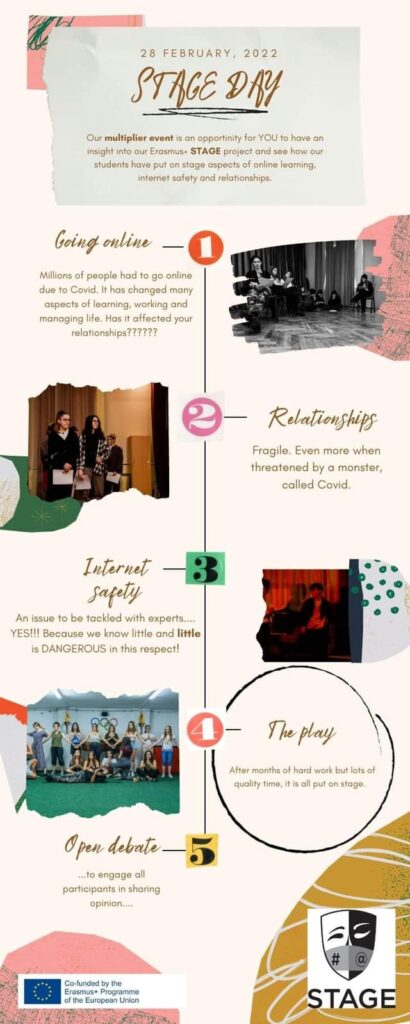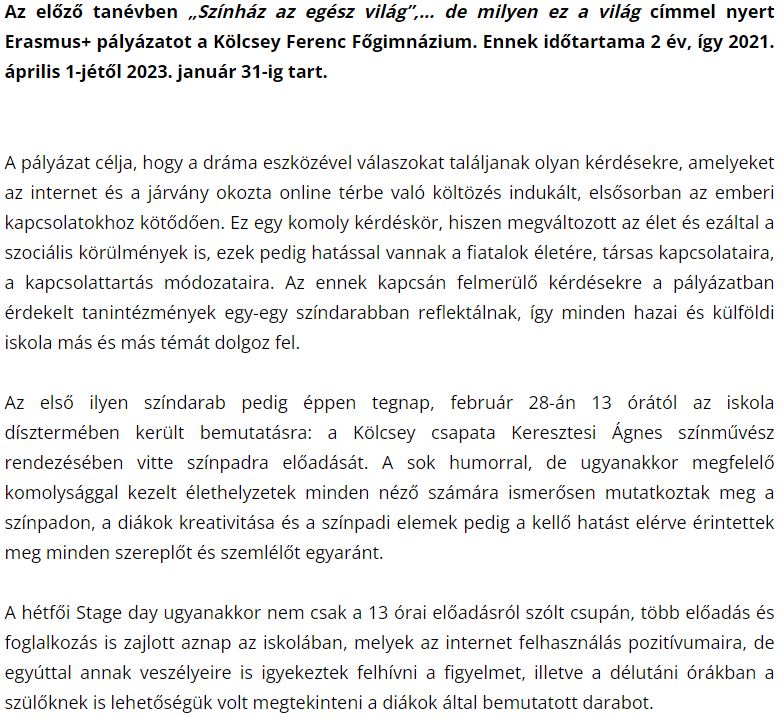
Within the framework of the project, each participating organisation must organise 3 to 3 STAGE day programmes around its own presentation. For the first time, the play was also performed at the Kölcsey in 2022. 28 February.
In addition to viewing the performance, the STAGE Day consists of a discussion about the performance with the producers and a professional discussion moderated by professionals with parents and teachers, as well as with the participants.
Using the experience of STAGE day, the performance can be further clarified and developed during the project, and it is also a good experience for the producers to see how the audience reacts.


Downloaded on 13.04.2022. 16:30
Source : https://www.szatmar.ro/Stage_day_a_Kolcseyben/hirek/118660
The Kölcsey Ferenc Főgimnázium in Satu Mare, together with the Giving Hungary Foundation and the Abacusan Studio in Hungary and the Digitalna Intelligencia Foundation in Slovakia, is participating in an Erasmus+ project, which will run from 2021 to 2021. from 1 April 2023. runs until 31 January. The total budget of the STAGE project is 274 648 euros, a quarter of which will go to the Satu Mare school, said Enikő Pataki, the director of the project. The aim of the project is to develop a mentoring programme that monitors the problems, conflicts and changes in the lives of teenagers – both as individuals and as a peer group – caused by the epidemic, and reflects on these issues using the tools of drama pedagogy and acting in the context of digital culture and art. The aim is to create interactive amateur theatre productions that allow young people to express the issues that concern them, and to find solutions through interactive games and discussions involving the audience. The plays produced under the project were to be performed in all three cities in February. Yesterday in Satu Mare, a performance called Contact Vaccina was presented as part of STAGE Day. Yesterday was not a dull day for the students of Cologne, as László Seer, lecturer of Babeş-Bolyai University, gave a lecture on internet safety at 9 am, followed by Gergely Butka, who also talked to the students about internet use, the positive opportunities of the internet, such as building a personal brand, and the dangers of the internet. The discussion was attended by tenth grade students. The highlight of the day was the interactive performance at 13:00, in which the tenth graders were joined by the eighth grade students of the Rákóczi Ferenc Primary School, and in the afternoon the students presented their performance to the parents.
What is ContactVacina about?
The play staged by the students yesterday was very interesting and thought-provoking, with a compilation of adolescents’ everyday problems, “mall girls”, “losers”, relationships between boys and girls, and how life has changed due to the isolation caused by the coronavirus epidemic. The extent to which students in different groups in school bully each other, the advantages and disadvantages of introducing online education. They hinted that they were jealous of each other, but they longed to belong to something, a group of friends or a couple. Adolescence is never easy, but it is even more difficult during the coronavirus epidemic, as relationships can only be maintained in the online space, and communication and communication with parents and guardians is also very damaged. And the behaviour of parents and educators, their attitude towards each other, is not very simple. In the play, written by students and rehearsed from September, Romeo and Juliet fall in love, Juliet steps out of her comfort zone, goes to a secret house party during the coronavirus epidemic, where she is not feeling well, wants to live up to her peers, so she even smokes a joint, which makes her act a bit strange, but the police who crash the party soon bring her back to reality. The policeman also punishes and scolds the children for not speaking Romanian, and ends up talking to everyone’s parents. At home, of course, they are reprimanded, but the biggest problem between the lovers is vaccination, as Juliet’s family is pro-vaccine and Romeo’s is anti-vaccine. At the end of the play, an online vote involving the audience will decide whether Romeo should be vaccinated. Yesterday at noon, the no vote won by a hair. The children even paid attention to the subtleties of online education when writing the text, as they often knew the technical part better than the teachers they looked up to because they knew everything.
Director Enikő Pataki moderated the discussion at the end of the performance, trying to get to the heart of what was at stake in the play. It was said that it’s all about the relationship, which has changed completely in the last two years, but that the rise of online methods is not always a bad thing, but it’s also true that real human relationships are made at parties, when people meet in person. The students tried to explore a thought-provoking topic through the Contact Vacinx, which also required precision in the background work. The presentation is planned to be shown in May to a group of children from other schools, and will also include a slightly different way of talking about the topic.
The stage actors of the interactive performance “Against the Virus/You: You” are Anna Matuz, Anna Mészáros, Anna Szénás, Tamara Pataki, Dóra Máté, Vanessza Kancsura, Angéla Oláh, Kincső Vadnay, Ingrid Kurtinecz, Hanna Sike, Nicolett Sarkantyus, Dóra Orosz, Kristóf Németh, Ármin Orosz, Máté Kis, Mátyás Katócz. The piece is directed by Ágnes Keresztes, choreographed by Franciska Szabó. Teaching assistance was provided by Katalin Fazekas and Árpád Csorján. The other props were Petra Háger, Csenge Pataki, Hannah Mihály, Eszter Kallós, and the technicians were Zoltán Lévai and Máté Török. S.B.

Downloaded on 13.04.2022. 16:33
